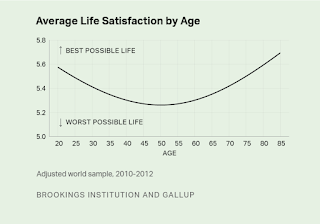Jon Clifton
Gallup.com
Originally posted 22 SEPT 22
While many things contribute to a great life, Gallup finds five aspects that all people have in common: their work, finances, physical health, communities, and relationships with family and friends. If you are excelling in each of these elements of wellbeing, you are highly likely to be thriving in life.
(cut)
Gallup's research as well as research by the global community of wellbeing practitioners has produced hundreds, if not thousands, of discoveries.
One of the most famous discoveries is the U-curve of happiness, which shows how age is associated with wellbeing. Young people rate their lives high, and so do older people. But middle-aged people rate their lives the lowest. This trend holds every year in almost every country in the world. It is nicknamed the "U-curve" of happiness because when you look at the graph, it looks like a "U." Some jokingly say that the chart is smiling.
Some discoveries are astonishing; others feel like they reveal a "blandly sophomoric secret," as George Gallup referred to some of his longevity findings. For example, you could argue that the U-curve of happiness simply quantifies conventional wisdom -- that people have midlife crises.
Here are a few of the discoveries that are truly compelling:
- People who love their jobs do not hate Mondays.
- Education-related debt can cause an emotional scar that remains even after you pay off the debt.
- Volunteering is not just good for the people you are helping; it is also good for you.
- Exercising is better at eliminating fatigue than prescription drugs.
- Loneliness can double your risk of dying from heart disease.
We could list every insight ever produced from this research and encourage leaders to work on all of them. Instead, we took another approach. Using all these insights from across the industry combined with our surveys and analysis, we created the five elements of wellbeing. And our ongoing global research confirms that the five elements of wellbeing are significant drivers of a great life everywhere.


